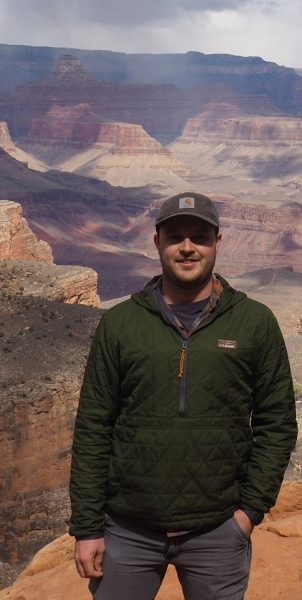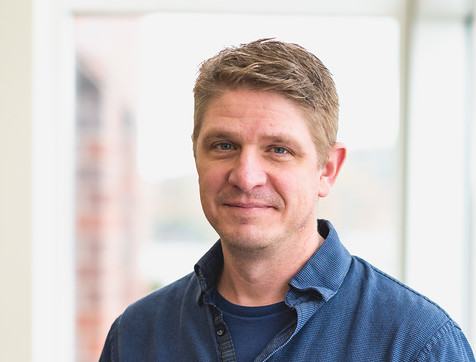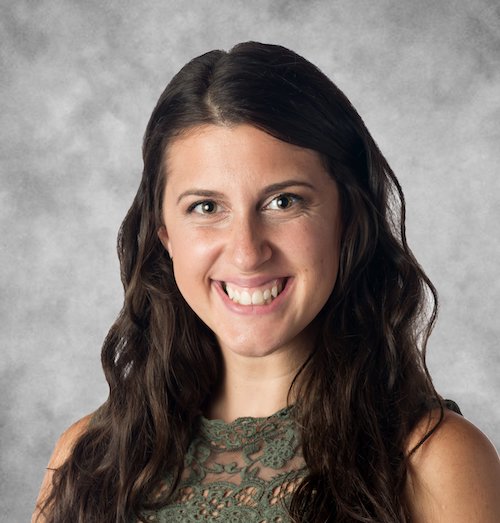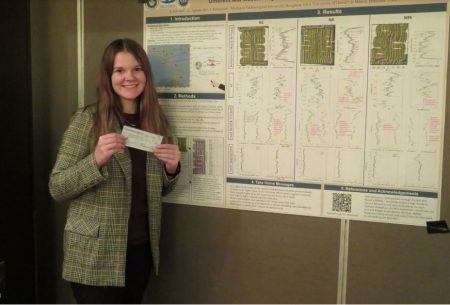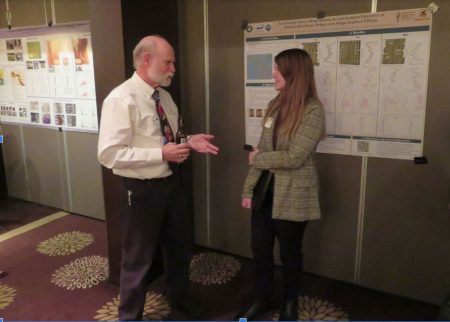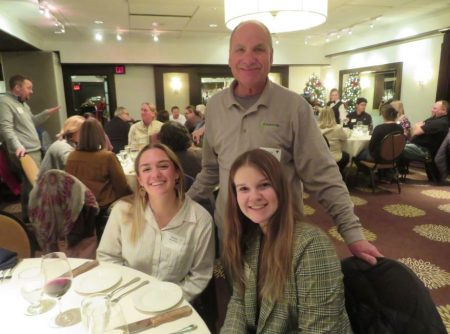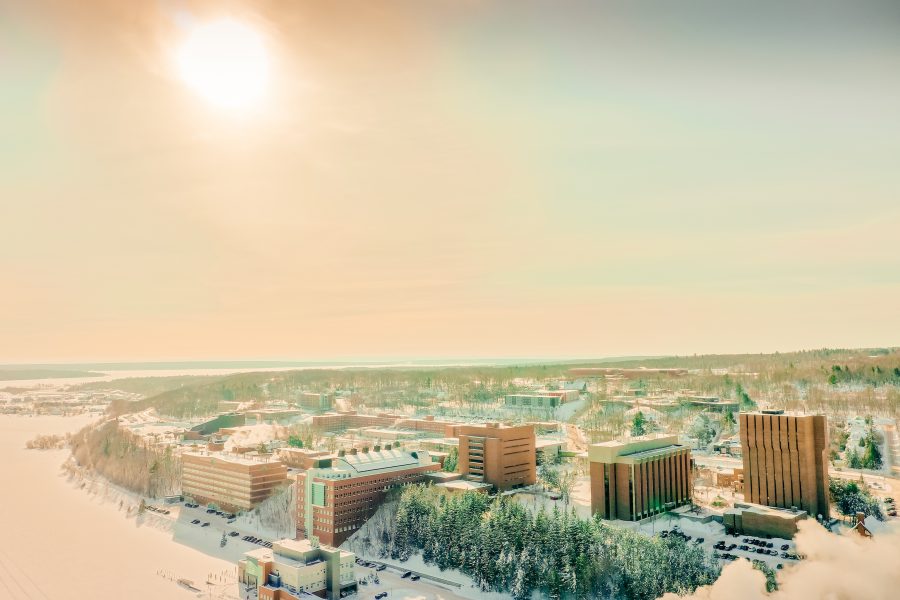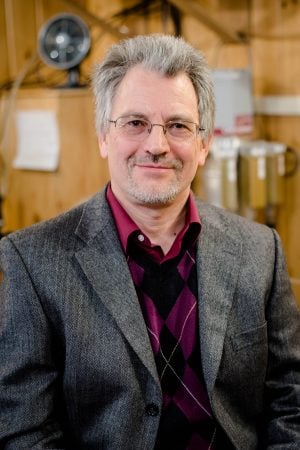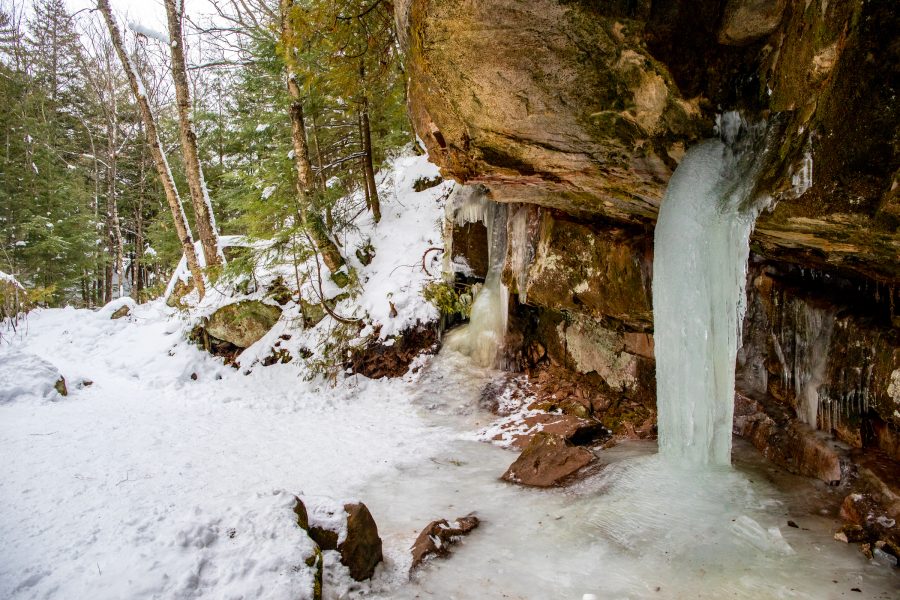Dakota Locklear received recognition as an Outstanding Graduate Teaching Assistant for exceptional work during the spring 2022 semester in GE2000 Understanding the Earth. Dr. Snehamoy Chatterjee advises Dakota as he pursues a Ph.D. in geology.
Locklear’s dedication and hard work, which did not go unnoticed, led to his nomination by the GMES Department. To be eligible for recognition as an Outstanding GTA, the candidate must have had sole responsibility for instruction in a lecture or laboratory course or section at any level within the past academic year. His praise as an Outstanding Graduate Teaching Assistant is a testament to his passion for geology and commitment to helping students learn.
Congratulations, Dakota, on this well-deserved recognition!
Ian Gannon (GMES) recently received the Dean’s Award for Outstanding Scholarship. The Dean’s Award for Outstanding Scholarship is given to students who excel academically and have demonstrated originality in their research, leadership skills, and professionalism.
Advised by Dr. James DeGraff, Ian successfully defended his MS thesis titled “Integrating LiDAR, Aeromagnetic, and Geological Field Data to Identify Structural-Lithologic Elements Within the Archean Carney Lake Gneiss Complex” on August 3, 2023.
Ian contributed significantly to the U.S. Geological Survey under the Earth Mapping Resources Initiative (Earth MRI) project. He helped the survey to understand the complex geological makeup of a section of the Minnesota River Valley subprovidence.
Gannon’s achievement is an inspiration for all the students who are passionate about research and innovation. Congratulations, Ian!
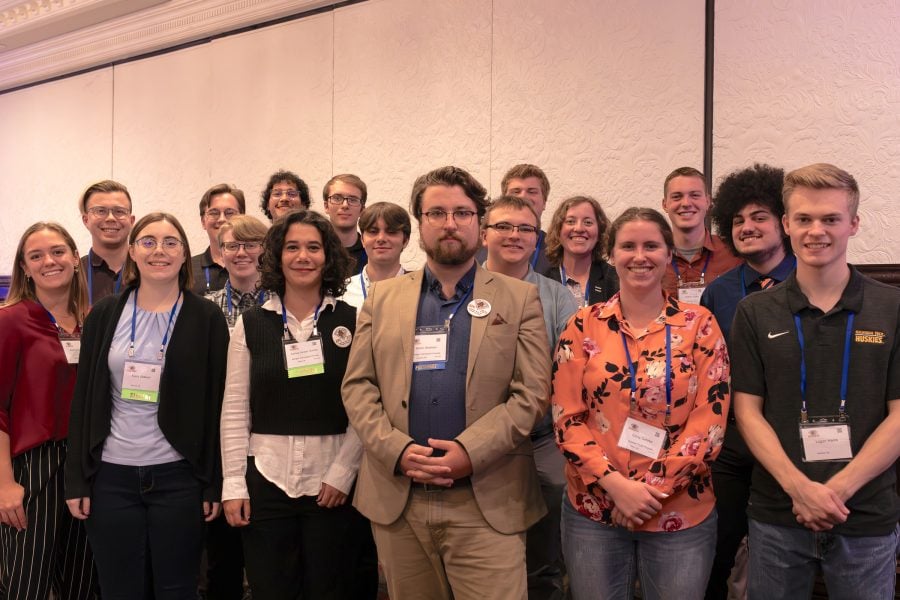
Professional development often means enduring challenges. For GMES students, not even the hardships of staying at campgrounds or incredibly long drives can deter them!
Sixteen GMES students recently marked their presence at the 60th Anniversary National Conference of the American Institute of Professional Geologists (AIPG) held in Covington, Kentucky, from September 16-19. Throughout the conference, the students gained insights into the organization and functions of AIPG, engaged in a Student Career Workshop, and networked with seasoned AIPG professionals.
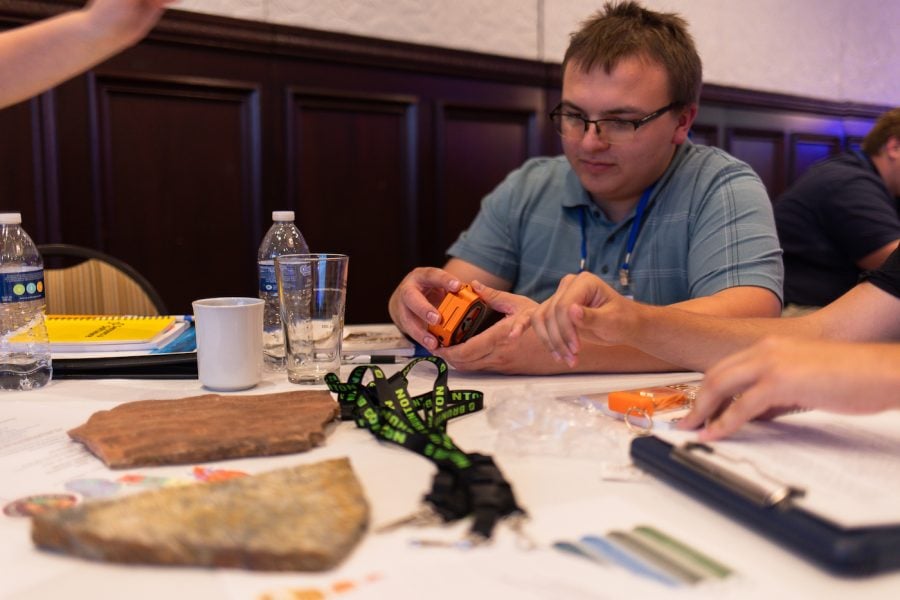
The students attended presentations by a mining geologist, a National Park geoscientist, and a geotechnical contractor, and asked questions regarding their respective fields. One of those students was Anton Smirnov (Geology ‘24). “It was a great way to learn about the wide range of fields available to graduates in geological sciences,” he said.
Students were treated to a technical seminar by Brunton, Wyoming-based maker of precision equipment for field-based professionals. Students also received some hands-on time with the company’s products. Samuel Johnson shared: “The demonstration of how the different models of compasses worked was a great educational experience, especially for students who haven’t used these compasses before.”
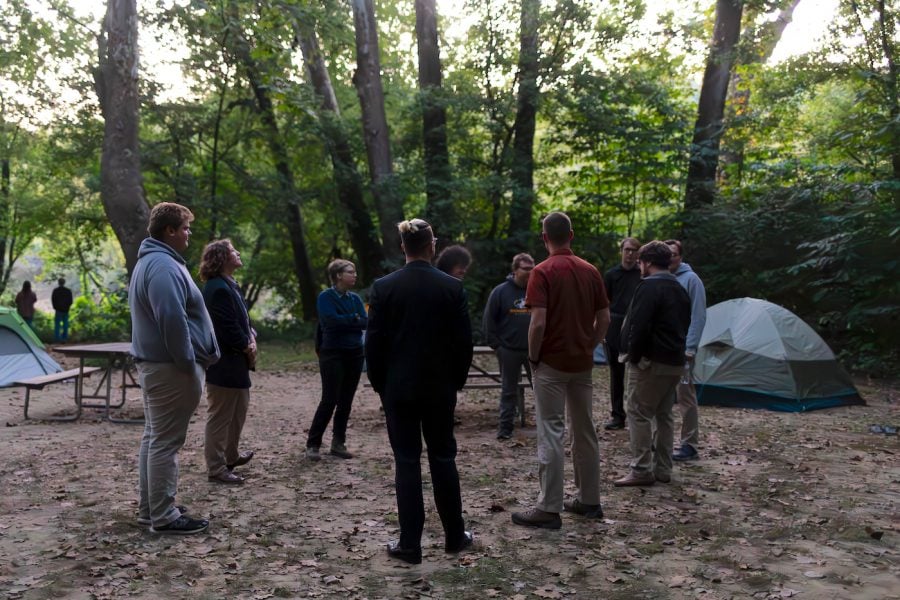
Finally, the chapter took part in a meet-and-greet event. The students rotated between tables of professionals and scientists specializing in various fields in geology and geological engineering. They also met with Kalan Briggs, the AIPG Michigan Section President; Adam Heft, the AIPG Michigan Section Newsletter editor; and Michigan Tech alumnas Sienna Meekhof (BS Geology ‘21) and Elana Barth (MS Geology ’23).
Barth is former president of Michigan Tech’s AIPG Student Chapter. She is now a geologist at AECOM, and generously assisted with accommodations for several students. However, embodying the true spirit of geoscientists, the majority of the students opted to stay at a campground near Covington.
All in all it was a rewarding time for the students. “Attending the 60th AIPG National Conference in Covington was a fantastic experience,” said applied geophysics major Brendan Harville. “I was able to speak with numerous professionals from a variety of geology industry disciplines, who not only provided insight into their own non-linear career paths, but also a great deal of excellent advice.”
The trip was organized and funded by the Michigan Tech AIPG Student Chapter: President Anton Smirnov, Vice President Clarissa Gordon, Treasurer Conor Large, and Secretary Brendan Harville.
This year the Michigan Tech GMES chapter was selected as the Second Place 2023 AIPG Student Chapter of the Year. The MTU chapter sponsor is David Adler, CPG-11377, a Mannik Smith Group Certified Professional Geologist (BS Geology ‘82).
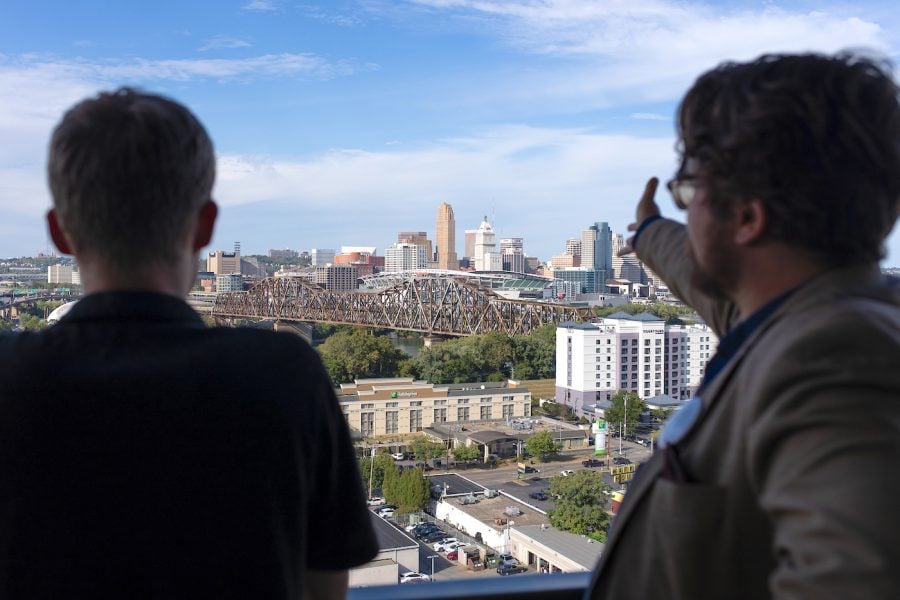
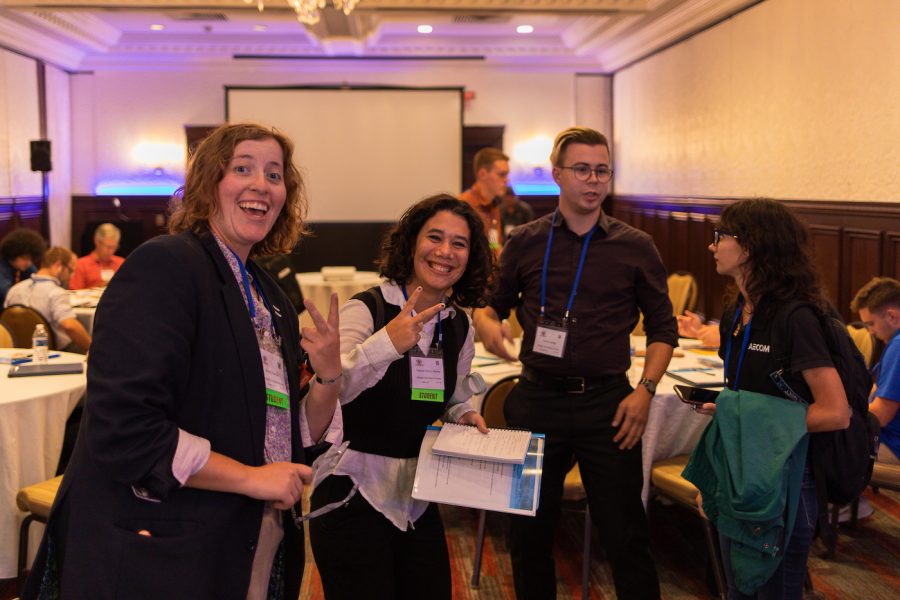
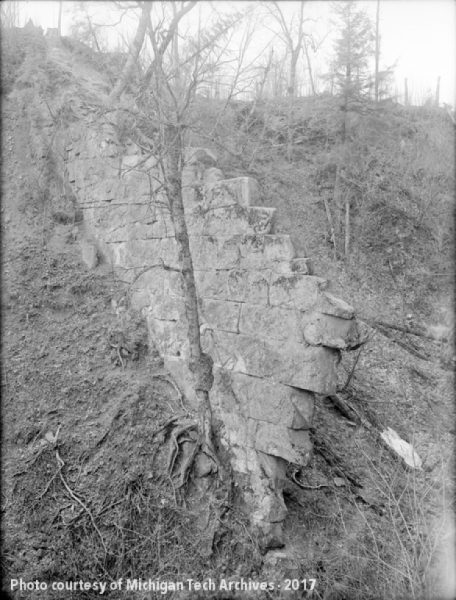
AIPG, the American Institute of Professional Geologists, recognized the student chapter at Michigan Tech as one of the outstanding student chapters in the nation this past year. The chapter is highly deserving of this distinction and honor and was selected as the Second Place 2023 AIPG Student Chapter of the Year.
The award consists of a certificate to be presented to the student chapter, and a certificate to each of the standing chapter officers at the time of the student chapter report submittal.
Some of the recent activities of the chapter involve field trips to mining foundations as well as to the Natural Wall, a geological structure formed of Jacobsville Sandstone.
The students are encouraged to attend the annual AIPG conference and meetings, which will be held next in Covington, Kentucky on September 16–19, 2023. During the conference, students will have the opportunity to observe the organization and functions of AIPG, participate in the Student Career Workshop, and attend a networking event with professional AIPG members.
The Chapter Sponsor is David Adler, CPG-11377, a Mannik & Smith Group Certified Professional Geologist (BS Geology ‘82). David Adler, inducted into the GMES Academy in October, has been awarded the AIPG Presidential Certificate of Merit for excellent contributions to the AIPG Michigan Section as chairman of the Michigan Section CPG application process.
The Chapter’s Faculty Sponsor is Chad Deering, associate professor in the Department of Geological and Mining Engineering and Sciences.
Related
Michigan Tech wins 2022 AIPG Student Chapter of the Year Award
The 2020 AIPG Student Chapter of the Year Award goes to Michigan Tech
Chad Deering, an associate professor in the Department of Geological and Mining Engineering and Sciences, has joined the Michigan Tech Academy of Teaching Excellence.
“Dr. Deering is an exceptional educator, teaching vital departmental courses such as mineralogy, petrology, geochemistry, and summer field geology,” says GMES Department Chair, Aleksey Smirnov. His extensive knowledge in these fields and engaging teaching style have earned him high praise from students.”
“His recent recognition for teaching excellence is a testament to his dedication and the impact he has on our undergraduate students.”
“Dr. Deering strikes a balance between being demanding and fair, challenging students while providing a supportive learning environment.”
The Michigan Tech Academy of Teaching Excellence was established in 1998 to recognize those who have demonstrated continued dedication to and support of the University’s teaching mission. Academy membership is comprised of finalists for the annual Distinguished Teaching Awards and the Fredrick D. Williams Instructional Innovation Award.
Deering was nominated for the William G. Jackson Center for Teaching and Learning (CTL)’s annual Distinguished Teaching Awards, which recognize outstanding contributions to Michigan Tech’s instructional mission. Based on more than 40,000 student ratings of instruction responses. He was among 10 finalists in the Associate Professor/Professor category identified for the 2023 awards.
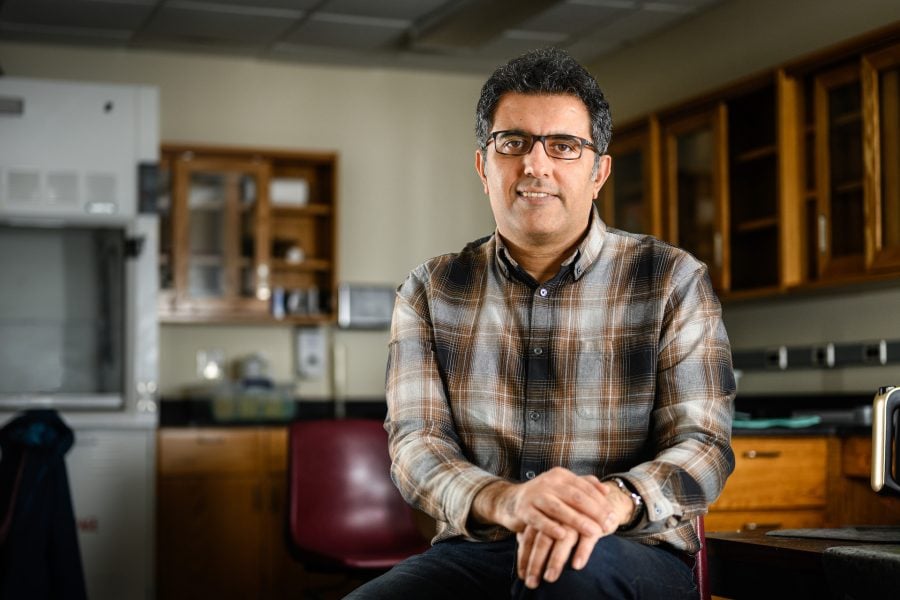
GMES Associate Professor Radwin Askari, a geophysicist who studies cavitation in volcanoes’ fluid-filled magmatic cracks, has earned a National Science Foundation (NSF) CAREER Award.
The awards recognize Askari, an associate professor of geological and mining engineering and sciences, as an early-career faculty who demonstrates the potential to serve as academic role model in research and education, and to lead advances in the mission of his department or organization. The five-year grant will support both research work and education outreach.
Askari’s award will enhance both research capabilities and educational opportunities in the Physical Modeling Laboratory.
Understanding Volcanoes Through Integrated Physical Modeling
Askari will receive more than $668,000 to continue research in the Physical Modeling Laboratory (PML), which he founded in the Department of Geological and Mining Engineering and Sciences (GMES). For his CAREER project, he’ll develop two analog apparatuses to investigate the cavitation mechanism in fluid-filled magmatic cracks and the developments of sub-cracks and seismic signals that result. Askari said it is crucial to understand both the cavitation mechanism and the dynamics of a volcano’s magmatic crack growth in order to estimate the scale of magma transport.
“The results from this research can improve the forecast of volcanic eruptions, which in turn can help to mitigate their consequent hazards.”
As a result, Askari will be able to assess other complex scenarios in fracture evolution and their corresponding seismicity, a major step toward his ultimate research goals in the field. He also plans to purchase new lab equipment, including a high-speed imaging system, to substantially enhance the PML’s experimental capacities. Other disciplines across campus, including biomechanics, aerodynamics and fluid dynamics, will also be able to use these advanced tools for future multidisciplinary research collaborations.
Askari plans to promote earth science literacy for students, educators and the public by producing several educational videos and a virtual PML lab tour. He will also offer summer research internships to students from traditionally underserved populations.
Askari said he’s grateful to GMES Chair Aleksey Smirnov, along with Assistant Vice President for Research Development Peter Larsen and colleagues in Tech’s Sponsored Programs Office, for their support and guidance. He also thanked retired GMES staff member Carol Asiala, an assistant research scientist and engineer, for her assistance with the nontechnical parts of his award proposal.
Learn more about the Physical Modeling Laboratory.
The William G. Jackson Center for Teaching and Learning (CTL) is seeking input for its annual Distinguished Teaching Awards, which recognize outstanding contributions to Michigan Tech’s instructional mission. Based on more than 40,000 student ratings of instruction responses, 10 finalists have been identified for the 2023 awards. The selection committee is soliciting comments from students, staff, faculty and alumni to be referenced during their deliberations.
Among the Associate Professor/Professor finalists is Chad Deering, who is an associate professor in the Department of Geological and Mining Engineering and Sciences.
Comments for the finalists are due by March 31 and can be submitted online.
The process for determining the Distinguished Teaching Award recipients from this list of finalists also involves the additional surveying of their spring 2023 classes. The selection committee makes the final determination of the award recipients. The 2023 Distinguished Teaching Awards will be formally announced in May.
For more information, contact the CTL at ctl@mtu.edu or 906-487-3000.
Our heartfelt congratulations to Brittany Buschell, the GMES department coordinator, on receiving the 2022 Above and Beyond Making a Difference Award!
Brittany, who joined GMES in 2014, goes above and beyond her duties as coordinator. She is incredibly creative and very skilled in artistic endeavors. She quietly applies these skills to her work in GMES as the unofficial department photographer and as a media creator. Any time that a picture of someone is needed, Brittany is there with her camera and the perfect flash for the event time and place. The pictures that are presented always look great—many of the faculty photos on our faculty webpage were taken by her!
With her love of rocks, Brittany fits right in at the geological and mining department. Several times each year she organizes Yooperlite hunting trips with our students. She grabs a bucket, her UV flashlight, and groups of brave students to walk the shores of Lake Superior at night collecting the Yooperlites. She even puts together gift bags to give out to donors, visitors, or prospective students. Each bag contains a Yooperlite and a card (that she designed of course) explaining Yooperlites. It can take a few hours to collect just a couple of Yooperlites, so you can imagine the time Brittany spends looking for these during the months without snow!
Brittany constantly goes above and beyond to create a comfortable, safe, enriching environment for our faculty, staff, and most importantly, our students. The GMES community is thankful for the positive difference she makes, and we congratulate her on this well-deserved recognition!
Addison Goecker, an applied geophysics senior at GMES, presented her research at the AIPG Michigan Section end-of-year meeting in Ann Arbor on December 8, 2022. Addison’s poster “Tectonically Versus Magmatically Accommodated Extension at Different Mid-Ocean Ridges and Ridge Segment Offsets” won her $500.00 in the student poster contest. Addison worked on this research during her summer internship at the University of Hawai‘i at Mānoa (Honolulu) with Prof. Garrett Apuzen-Ito and Dr. Jana Schierjott. Congratulations, Addison!
Dear Friends, Colleagues, and Alumni,
Greetings from the Department of Geological and Mining Engineering and Sciences at Michigan Tech! I hope that this newsletter finds you well and in good spirits.
The second half of the year 2022 has brought our Department new challenges, but also achievements and successes.
First and foremost, I am proud to report that, after some hiatus, we inducted eight (!) new members to our Academy of Geological and Mining Engineers and Scientists. I hope you will join me in congratulating David Adler ‘82, Daniel Farrell ’60, Mary Herrmann-Foley ’83, Terre Lane ’82, Julie (Varichak) Marinucci ’02, Richard Saccany ’71, Brian Schwanitz ’77, and Todd Stone ’85! The Induction Ceremony, held on October 14, was a success and well-attended. In particular, we were happy to see the current academy members Catherine Aimone-Martin, Suzanne Beske-Diehl and Jimmy Diehl, William Brice, Karl Burgher, Gerald Carlson, Richard Gray, Catherine Dummer McRae, and Bill Rose. The festivities continued the next day with a Director’s Tour of the Mineral Museum and apple pressing at Professor John Gierke’s farm. Everyone had a good time. I would like to praise Brittany Buschell, our Department Coordinator, whose diligent work was instrumental in the success of this event. I intend to preserve the biennial cycle of the Academy from now on.
The success of our department is ultimately measured by the success of our students, and it is no secret that we’ve been blessed with more than our fair share of capable, dedicated, enthusiastic individuals who’ve been very successful in their classes and professional development. Just to give you a small sampling of these successes—our student chapter of the American Institute of Professional Geologists won the nationwide Student Chapter of the Year Award, not just one time, but three times in a row! Our mining engineering senior, Jake Maxon won the highly prestigious national Lord Bagri Scholarship Award from the Copper Club. It’s the second time in a row the award goes to our students.
In addition, our geology majors, Elliz McClelland and Samuel Johnson received the DeCleene Memorial Scholarship awarded by the Copper Country Rock and Mineral Club (CCRMC). Our graduate students get awards, too. For example, Beth Bartel was awarded the Outstanding Teaching Assistant Award from the National Association of Geoscience Teachers (NAGT) and the prestigious Smithsonian Institute Fellowship. Beth was also featured in the book, Quake Chasers: 15 Women Rocking Earthquake Science—check it out!
Increasing undergraduate and graduate enrollment to full capacity is one challenge that remains. We have been active in our recruitment efforts. We recently developed an articulation agreement with the Northwestern Michigan College (NMC) for our Geology and Applied Geophysics programs. We plan to complete similar agreements for our Geological Engineering and Mining Engineering degree programs soon. I am especially grateful to Luke Bowman, research professor and recruitment director, for his meticulous and efficient work in developing these initiatives. So far we have been able to withstand national enrollment trends, even slightly increasing our numbers this year. But much more remains to be done.
We are dedicated to providing students with the greatest possible opportunity to succeed—something we can only do with the best faculty, staff, equipment, facilities, and scholarship opportunities. Your generosity makes our goal of providing truly excellent undergraduate and graduate experiences a reality, as we educate the scientists and engineers of the future, while still meeting the needs of today’s employers.
We especially need your help to support incoming and current students. This can be done in a variety of ways: funding undergraduate scholarships and graduate fellowships; helping us to incorporate modern instrumentation and software in the classroom and field; developing new opportunities for the professional development of our students; and extending our efforts to offer a cutting-edge, quantitative, digital-age curriculum. You can find more information here, or contact me via email, at asmirnov@mtu.edu.
On behalf of all of our students, faculty, and staff, I want to express our deepest gratitude to those of you who have provided support to our department, by sharing your experience and expertise, providing professional opportunities to our students, or offering monetary and logistical support. As always, we welcome all new ideas and inquiries, so please don’t hesitate to get in touch.
Alumni and friends are always welcome in person, too! Feel free to stop by the department office (room 630) on the 6th floor of the Dow Building whenever you are in Houghton. We would be very pleased to meet with you and arrange a tour of the teaching and research laboratories during your visit. Meanwhile, I invite you to stay connected to the department via Instagram, Facebook, Twitter, and our website.
Wishing you a happy and healthy holiday season!
Aleksey Smirnov
Professor and Chair
Department of Geological and Mining Engineering and Sciences
